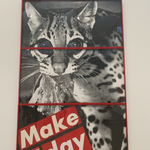-

I agree with all the comments above. I considered using Exist years ago but am just now coming back to try it again. The number of integrations available today make it much more appealing. If Toggl integration had been available then, I might have started sooner. If you do add Toggl integration, I’ll probably be a user for life…
-

Hey! Initial implementation! This is great, because this is actually how I use Toggl right now—only to track work time.
What would be an amazing next step is if Exist treated Toggl projects like custom tags—so you could get the correlations that I think many of us are looking for here—you work on {blank} more when you get more sleep, answer less emails, etc.
But again, congrats and hooray that Toggl is here!
-

Hey Craig, our integrations don’t work this way, as custom tags are for you to manually track things. You’re totally welcome to use your own tags that happen to match client or project names from Toggl, or even write your own personal API integration to do this automatically, but it’s not something we’ll be adding.
We may add some specific correlations around projects, for example “you have a better day when you work more on project x”, but we’ll still only track the productive time attribute.
-

Great that this is now launched but I agree that it needs to be a bit more flexible.
Toggl isn’t just for tracking “productive time” (I track pretty much all of my time, 24 hours a day), but currently anything I track in Toggl is classed as productive time.
This is meaningless unfortunately so will have to deactivate this for now.
-

Sorry Adam! Toggl literally bills itself as a productivity/work time tracker, so I don’t think we’re missing something by going along with that. They also don’t provide breakdowns of productive, neutral, and distracting time, like RescueTime does (which makes sense because they’re not about that), so there’s no easy way for us to do that either. It sounds like RescueTime’s paid plan would be a better fit for you, where you can both manually enter activites and put them into a productivity category, letting you track your other activities as neutral for example.
-

Hi Josh! :)
I’m not sure if I fully agree that “Toggl literally bills itself as a productivity/work time tracker, so I don’t think we’re missing something by going along with that”. I understand your point and the current implementation makes sense, but it could be more flexible as others said.
I use Toggl for many things, not just work, but let’s keep other things aside. Considering only my work time, I have different projects, one for productive work (coding, writing work specs, fixing issues reported by support, etc) and others for things I consider non-productive but are still work (replying to an email, organizing stuff on the current sprint, breaks here and there, etc.).
Toggl is a open tool and people can use it in many ways, so it’s hard for a tool like Exist to map all these usages, we know that. If we had a bit more control, like chosing a project, tag, or anything, it could better apply to different workflows.
Hope it helps to add more information here.
Keep up the great work. :)
-

As I previously send some email to Belle about this too! Totally got you point, but Toggl is a Clint, Project based time tracking. So it will definitely help if we can have these Client, Project intergration and see how these related to our other data. And not just for us, plenty of people are tracking more than productivity time, since it is a time tracking tool.
-

I’ll add support for correlations based on individual projects, so you can at least see how different projects relate to your other attributes. But with the way integrations work, we can’t track different projects’ time as different attributes, and I’m not going to build in an interface for managing whether different projects or clients are considered productive or not — there are many reasons why this would be a bad idea. You’re always welcome to manually add tags to your day that correspond to client or project names.
When we support manual tracking, it should theoretically be easier to add each project as a separate attribute, tracking how much time you spent per individual project rather than as one total, so I can revisit that approach again then if there’s still a desire for it.
-

Toggl actually bills itself as a time tracker, and that’s exactly what it is. It’s basically up to me to decide which of that time is productive or not. The main reason I stopped using RescueTime was because it kept getting that wrong.
For example, a key aspect of my job is marketing, so Facebook can either be very productive, or not at all if I’m actually just wasting time looking at non-work stuff.
I literally have a Project in Toggl called “Personal” where I track my personal time, because it’s important to me to track how much time I’m spending with family, friends, etc. Even then, some of that personal time is productive and some is non-productive. I’m interested in that, but it’s not the only thing I’m interested in.
That’s why tags exist in Toggl just like they do in Exist. Even RescueTime’s productivity rating is really nothing more than a tag against a record.
I can definitely see that it would be impossible, as you say, to categorise all the synced data as “productive” or “neutral”, because that’s not always what it’s about. So why try? There’s huge potential for this integration if you just sync the user’s projects, tasks, clients, tags, etc and just show them the correlations with your other data, e.g:
-“You get less sleep when working on [Project]” -“Your heart rate is higher when working for [Client]” -“Your mood is better when you spend more time on [Task]” (e.g. “Family”) -“Your have a lower average heart rate when your billable time is less than [N]”
The same goes for the RescueTime integration tbh, it’s just not my personally preferred time tracker.
-

I agree with Adam, whatever toggle is designated, it is a time tracker. I don’t “work” in classic meaning, I’m a mom at home, but I track my time (sometimes I feel, I just don’t do anything. But than I can see in my tracker app, yes, I did.). Now I use the tags to track, what I did during the day, but it is a little bit hard. If you get data from toggle, would be great to do this automatically. This is why I use Exist. That I don’t have manually track all the different data. Do I feel better, if I cooked/made laundry, read, gamed? With a whole integration, I would know this. Productive time is… How to say. Says just nothing.
-

Just chiming in to say I’ve been using a manual API integration to push data from Toggl to Exist for over a year now, and I made it separate my data on Toggl’s projects. I set a tag that matches the project name for any day I worked on that project. That’s given me good visibility into different kinds of things I track in Toggl, which like many people, is not 100% “work” time. I’d love to see the native integration support even just project-level granularity!
-

Is it possible to rely on some sort of hardcoded tags? If you want this to be considered as “unproductive” add an “exist-unproductive” (or anything the Exist team defines) tag to it, otherwise it will be considered as productive.
I’m just trying to suggest something that will not break people’s usage of Toggl and still can de useful to Exist. I don’t use tags for anything but could use for that.